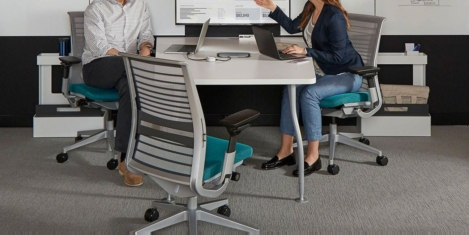April 6, 2017
Designing space for virtual collaboration in an untethered world 0
 Working with colleagues across different geographies and time zones has become the norm since an increasing number of organisations now integrate and seek collaboration at a global level. Interestingly, according to Cisco, 62 percent of workers now regularly collaborate with people in other countries. These globally integrated enterprises (GIE) aim to draw in the best talent from across the world, delivering maximum innovation and efficiency. The rise of global and distributed teams has been further encouraged by the popularity of remote working, with 71 percent of office workers now choosing greater flexibility to work from various locations instead of travelling to the office everyday . And the trend only looks set to gain pace, with 56 percent of senior leaders in large global companies expecting global teams to increase in the next one to three years.
Working with colleagues across different geographies and time zones has become the norm since an increasing number of organisations now integrate and seek collaboration at a global level. Interestingly, according to Cisco, 62 percent of workers now regularly collaborate with people in other countries. These globally integrated enterprises (GIE) aim to draw in the best talent from across the world, delivering maximum innovation and efficiency. The rise of global and distributed teams has been further encouraged by the popularity of remote working, with 71 percent of office workers now choosing greater flexibility to work from various locations instead of travelling to the office everyday . And the trend only looks set to gain pace, with 56 percent of senior leaders in large global companies expecting global teams to increase in the next one to three years.











 Accommodation and food services, manufacturing, and transport industries will be hardest hit by limits on movement of EU and non-EU workers following Brexit, a new report has claimed. The latest edition of Mercer’s
Accommodation and food services, manufacturing, and transport industries will be hardest hit by limits on movement of EU and non-EU workers following Brexit, a new report has claimed. The latest edition of Mercer’s 


 A majority (84 percent) of British employees use their smartphones at work, with 78 percent regularly responding to text messages during working hours and on average spending as many as 120 hours per year using their smartphones during the working day claims new research. The data, compiled by LaptopsDirect.co.uk, also found that 59 percent regularly take personal phone calls whilst working; 52 percent admit to answering instant messages via platforms such as Whatsapp and Facebook, and 9 percent have sent a Snapchat from their workplace. Employers are not completely against the use of smartphones, though under half (44 percent) permit the reasonable use of smartphones, according to the research; but 14 percent of respondents admit to having been told off for using smartphones at work, and 4 percent have been disciplined for use of their own tech during work time. Of most concern for employers is the fact that more than a third (38 percent) of respondents regularly check their social media accounts while at work.
A majority (84 percent) of British employees use their smartphones at work, with 78 percent regularly responding to text messages during working hours and on average spending as many as 120 hours per year using their smartphones during the working day claims new research. The data, compiled by LaptopsDirect.co.uk, also found that 59 percent regularly take personal phone calls whilst working; 52 percent admit to answering instant messages via platforms such as Whatsapp and Facebook, and 9 percent have sent a Snapchat from their workplace. Employers are not completely against the use of smartphones, though under half (44 percent) permit the reasonable use of smartphones, according to the research; but 14 percent of respondents admit to having been told off for using smartphones at work, and 4 percent have been disciplined for use of their own tech during work time. Of most concern for employers is the fact that more than a third (38 percent) of respondents regularly check their social media accounts while at work.

















March 30, 2017
Social technology has the power to make the workplace more humane
by Amanda Sterling • Comment, Technology, Workplace
(more…)